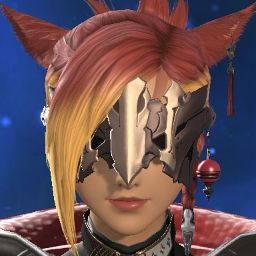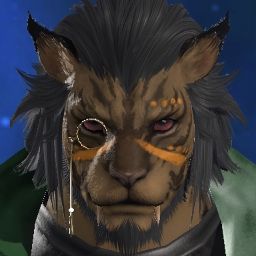well Y'sthola is a magus if she learned her BLM on the 1st shard ;p
Thread: Revelations from Keynote II
-
02-07-2019 03:54 PM #171(0)
-
02-07-2019 10:04 PM #172Player

- Join Date
- Jul 2012
- Location
- Gridania
- Posts
- 4,116
- Character
- Florence Leduc
- World
- Ragnarok
- Main Class
- Monk Lv 90
the reason are actually simple.... and quite disturbing.
if she is really in the first shard, like i guess... the first shard is satured by light... minfillia did gone there for stop the collapse of the shard... but we can guess that Solus did decide to commence to send ascien there for speed the collapse and create the 8th calamity.... means the only way to rebalance the shard is to create darkness.... means maybe she was doing dark stuff for counter balance. (probably killing ascien henchman) because yes ascien don't really care if it's darkness or light, all they want is to fuse back the world.... for allows them god to fight hyadelin.
a point before a time travel theory come back... Rak'tika greatwood are said to be the house of the viera (at least they was making big hint in the keynote) however we know from ivalice raid that the viera come from Golmore jungle... then it's highly possible that raktika is the name of golmore in the 1st shard.(0)
-
02-07-2019 11:31 PM #173Player

- Join Date
- Dec 2013
- Posts
- 3,822
- Character
- Lineage Razor
- World
- Gilgamesh
- Main Class
- Goldsmith Lv 90
I don't think that the "countless yous" scenario really works in this case. That more applies to stuff like Groundhog's Day, where you're repeating the same segment of time over and over again until you get it "right". That's an entirely different sort of time travel than that implied by a stable time loop.
A closed time loop of this sort is more like a roller coaster. You're riding along like normal, then you come to this loop which takes you to another point in time. That loop was always there, and you only rode it the one time. Even if the time travel causes there to be more than one you at the same point in time, they aren't countless, they are limited by the number of times that you actually travel to that point in time. (The most Alexander ever supplied was two simultaneous WoLs - the point in A12 where you travel to the past to save your past self from Alexander's blast.)
It's also important to realize that this time loop was always a thing. There IS NO "original" timeline that was altered to create the time loop. This IS the original timeline. It just happens to be that the original timeline has a tangle in it.(6)
-
02-08-2019 09:54 AM #174Player

- Join Date
- Sep 2013
- Location
- The Hermit's Hovel
- Posts
- 3,713
- Character
- Trpimir Ratyasch
- World
- Lamia
- Main Class
- Gunbreaker Lv 100
That's a valid way to look at it... but since time travel is purely hypothetical, there's no "right" answer.
Regardless, what I supplied is something that has no paradoxes, i.e. is logically sound. Without a "Zeroth Loop" we can't observe where it all started, causality breaks down. To use the example of a hypothetical perpetual motion machine again, sure you could build one... but someone would have to set it in motion for it to start working.
To use the roller coaster example - yes, everything proceeds along the one track, a loop de loop causes you to spin for a moment, and then you continue onward to the exit. But what about characters like Mide, Dayan, and Quickthinx - who only exist within Alexander's looped time? Who only exist because of Alexander's looped time? Who's operating the roller coaster?
Your present self is saved by your future self before A12, who then has to save their own past self. But then your past self has to do the same things you did... and save their own past self, ad infinitum. Otherwise we end up with a time paradox, which lies beyond our observation (if only because we are dead in those possible "futures"). There are "potential yous" who deviated from the script... we just can't observe them (i.e. the "you" who died to Alexander's Holy Judgment because the "future you" failed to save them).
... time travel is complicated.(1)Trpimir Ratyasch's Way Status (7.4 - End)
[ ]LOST [X]NOT LOST
"There is no hope in stubbornly clinging to the past. It is our duty to face the future and march onward, not retreat inward." -Sovetsky Soyuz, Azur Lane: Snowrealm Peregrination
-
02-08-2019 12:08 PM #175Player

- Join Date
- Nov 2017
- Posts
- 14,168
- Character
- Aurelie Moonsong
- World
- Bismarck
- Main Class
- Red Mage Lv 100
The thing with Alexander is that while, from one viewpoint, things go around and around infinitely.... there is only one timeline, and there was only ever one timeline. It's a stable time loop, where everything plays out the same way every time (except there's only really one time).
From the perspective of each person involved in the story, they only experience their sequence of events once. That sequence may move strangely through time, and they may experience the same time period twice at different times in their personal timeline, but nobody is stuck "going around" the same actual sequence of events and carrying out the same actions over and over. They all have an entrance and exit point from the story.
There are loops and oddities, but no alternate outcomes. There are no "potential yous" that failed - there is one sequence of events where you did save yourself, and it's only an infinite loop if you stop tracing our single (slightly non-linear) path through the events, and start thinking of "past you" and "future you" as different people who might act differently the next time around.
Quickthinx isn't any more a product of the time loop than we are. He found Backrix's lost journal (three years 'before' it was written) that chronicled future events, giving him apparent omniscience, but his only actual time travel was the brief "detour" to three years ago that everyone experienced, before returning to our normal place in time.
And Mide and Dayan? Yes, their existence infinitely depends on time travel having happened in the first place - but there was never a timeline where it didn't happen, and they individually are not reliving the same time over and over.
Mide's timeline is fragmented from an external view of time moving from past to future, but she individually is still born, lives, and dies. Her personal timeline begins 26 years ago, plays out normally up to the events of Alexander, which ultimately lead to her being teleported back into the past - where she lives the rest of her life, has children and eventually dies at what is probably an earlier date than her birth.
Weird genetics ensue, and somehow one of her descendents ends up as a perfect genetic match. Perhaps it's chance she also got the same name, or perhaps her great-grandmother insisted.
We're all set for it to play out again - but young Mide has never experienced it before.(5)
-
02-11-2019 08:46 AM #176Player

- Join Date
- Sep 2013
- Location
- The Hermit's Hovel
- Posts
- 3,713
- Character
- Trpimir Ratyasch
- World
- Lamia
- Main Class
- Gunbreaker Lv 100
Objection!
This requires an in-depth understanding of what an observer is.
An observer has a very special role in time, that is it determines which causal pathway happened.
To use an example, say we set up a flashlight in front of a piece of plastic with two slits. If you turn on the flashlight, photons stream through the two slots and into the background. However, given each photon can only travel through one of the two slots, we can't know which one because they simply move too fast for us to observe individual photons, so we have to assume it could have gone through both. However, say a device was created that could tell which of the two slots a photon went through. Now we have knowledge of which slot the photon traveled through, but only because something was created to determine that.
The "device" mentioned here is the observer; without it we'd have to assume that each given photon could have traveled through either of the two slots.
It's a lot like applying a save state to reality. If you save your game and choose option A, option B becomes impossible - you've observed option A, which is mutually exclusive with option B. You can choose to go back and reload the save state if you want to see the outcome of option B at a later date (for whatever reason), but the characters aren't aware of this - option A's characters are not the same as option B's characters. You are, in effect, the observer.
Apply this to time. Every action taken by everyone and everything creates infinitely tessellating possibilities, but because this "us" only exists in one timeline (option A), we can't observe the "us"es that exist in every other possibility.
In the context of Alexander, that means yes, there has to be a timeline that created Alexander - because there are infinite timelines where he never existed at all. Someone or something had to create him. The tricky part about Alexander is that due to his power over time he is essentially his own observer, but he can only observe timelines in which he exists. Of the infinitely tessellating possibilities stemming from everything that happens within his storyline, Alexander has to always make the same choices and observe only the timeline we play, because otherwise it creates a temporal paradox.
Do we remember each individual instance of the time loop? No, it's a quantum singularity - everything that happens in and around Alexander has to happen in our timeline, because from our perspective anything else creates a temporal paradox. But... even though we can't observe them, there are infinite other timelines where things played out differently. Something, at some point in some timeline has to be responsible for Alexander's creation and time loop, we just can't observe what because from our perspective Alexander has always existed as a part of the timeline.
It's why I've postulated Hydaelyn acts as our observer (She chooses only the timeline She wants, i.e. the one where we're successful even in the face of nigh-impossible odds; your PC's deaths are just possibilities She chooses to not observe).
TL;DR - time is really complicated, but to say there's only one timeline isn't accurate. There's just only one we can observe.(4)Trpimir Ratyasch's Way Status (7.4 - End)
[ ]LOST [X]NOT LOST
"There is no hope in stubbornly clinging to the past. It is our duty to face the future and march onward, not retreat inward." -Sovetsky Soyuz, Azur Lane: Snowrealm Peregrination
-
02-11-2019 08:18 PM #177Player

- Join Date
- Nov 2017
- Posts
- 14,168
- Character
- Aurelie Moonsong
- World
- Bismarck
- Main Class
- Red Mage Lv 100
I still don't accept the "infinite possible timelines", certainly not in conjunction with the Alexander quests. It's all ultimately theoretical, but everything within the story points to a "single timeline" theory, not multiple possible outcomes. Alexander can predict other timelines, but they aren't all coming into being.
In fact, Alexander's purpose as explained at the end of the story - to calculate all the possible timelines and take action to make the best option become reality - seems to contradict the option for multiple timelines. Only one can be chosen to play out.
And Alexander wasn't created outside of the timeline. It's part of the loop - the goblins, inspired by the Enigma Codex, dreamed up the walking fortress and willed it to life within a Sharlayan defence mechanism that was already located in the lake.
And ultimately? I don't like multiple timelines. It has the awful connotation that no matter what you do and how many lives you save, there are other realities out there where they are still suffering.(4)
-
02-11-2019 08:21 PM #178Player

- Join Date
- Nov 2016
- Location
- Limsa Lominsa
- Posts
- 973
- Character
- Miyo Mohzolhi
- World
- Sophia
- Main Class
- Scholar Lv 100
I remember reading up on this sort of stuff back when I was looking into various terminology and jargon used by other speculative fiction, but I soon gave up because I have this instinctive urge to try to simplify and analogize everything, and I get the feeling this does not work with quantum concepts.
This discussion did remind me of the concept of quantum immortality, ie the Schroedinger's Cat thought experiment from the viewpoint of the cat. Basically, the cat is always alive, because otherwise there would be no observer to observe the timeline, since there is no outside observer (at least for the sake of this thought experiment).
And then I got to wondering how far we can apply this to the way players keep wiping to raids and bosses, and yet the Warrior of Light continues to survive and win, from the viewpoint of everyone else.(3)
-
02-12-2019 01:03 PM #179Player

- Join Date
- Nov 2017
- Posts
- 14,168
- Character
- Aurelie Moonsong
- World
- Bismarck
- Main Class
- Red Mage Lv 100
So, back on a different subject.... G'raha Tia again.
If he is indeed the mysterious Voice calling to us, I've just realised some rather curious foreshadowing - because how are we first introduced to G'raha in the Crystal Tower setup quest?
As a mysterious disembodied voice calling to us and giving us instructions.
If that's actually a hint, that's genius.(2)
-
02-12-2019 04:41 PM #180Player

- Join Date
- Nov 2017
- Posts
- 14,168
- Character
- Aurelie Moonsong
- World
- Bismarck
- Main Class
- Red Mage Lv 100
The really simple answer is that the player messed up, and didn't make the character do what they needed to do to continue the pre-planned story.
But for an in-game explanation, there's the Echo.
For the most part, I've assumed that it is giving us some kind of premonition - a brief vision of what would happen in the near future if we don't dodge that attack, or aren't ready to heal our friend when they get targeted, or know how to respond to the spell that we saw the enemy casting, but didn't know what to expect.
Although having just replayed the Warriors of Darkness arc, I have to wonder about that. During the battle instance against them, you get them down to zero HP and then they "call on the power of the Echo", which revives them in a blaze of light.
So is that supposed to be a genuine "Echo mechanic" rather than just a gameplay mechanic? Do we really, actually call on the Echo and get revived?
Although on the other hand, perhaps not, as normal gameplay mechanics would suggest rewinding time as well (since we return to the start of the battle and the enemy follows their script again). We don't seem to see this happen in the WoD fight - we don't get sent back to the start of the battle each time they use the Echo.(1)



 Reply With Quote
Reply With Quote







